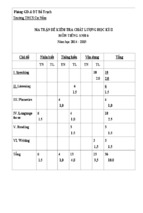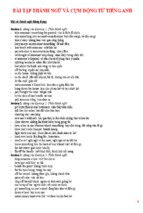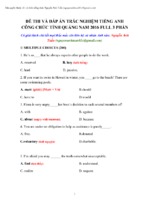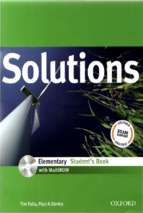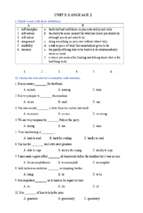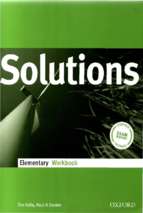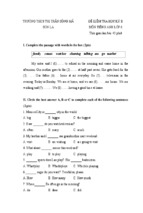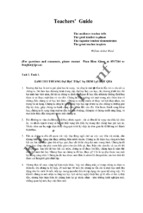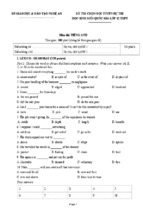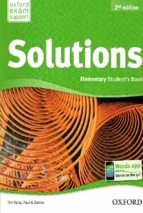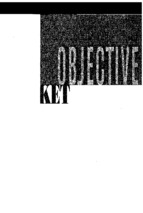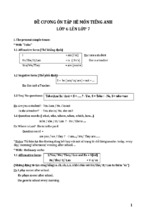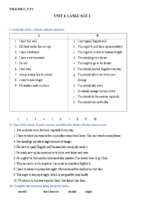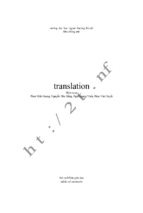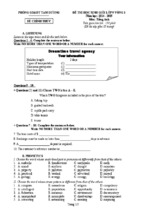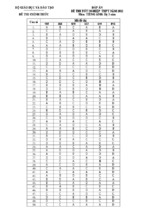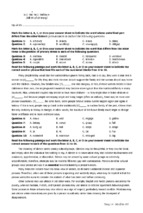BỘ GIÁO DỤC VÀ ĐÀO TẠO
ĐỀ THI TUYỂN SINH ĐẠI HỌC
ĐỀ THI THỬ
(Đề thi có 05 trang)
Môn: TIẾNG ANH; Khối D
Thời gian làm bài: 90 phút
Họ và tên thí sinh: ..........................................................................
Số báo danh: ..............................................................................
Mã đề thi: 321
ĐỀ THI GỒM 80 CÂU (TỪ QUESTION 1 ĐẾN QUESTION 80).
Find the word with different stress
1. A. concern
B. respect
C. audience
D. rotate
2. A. promise
B. feedback
C. superman
D. receipt
3. A. dilute
B. amateur
C. aerobic
D. conceive
4. A. perpetuate
B. propulsive
C. precedence
D. distinguish
5. A. simultaneous
B. handkerchief
C. innovative
D. cynicism
Choose the best answer
6. He feels that his rise in _____ is well worth the loss of money.
A. situation
B. drift
C. wonder
D. wander
7. The police were _____ when Mrs. Ramsay told them what she had done.
A. esteemed
B. astounded
C. astonishing
D. flickered
8. Antique shops exert a(n) _____ fascination on a great many people.
A. peculiar
B. especial
C. hysterical
D. unconscious
9. Recognizing who the customer was, the manager was most apologetic and _____ the assistant
severely.
A. disregarded
B. grudged
C. reprimanded
D. complained
10. They can’t _____ their son’s rudeness any longer.
A. release
B. ignore
C. torment
D. suffer
11. The fellow laughed silently to himself at the trick he has _____.
A. caused
B. played
C. performed
D. made
12. The new work of Japanese scientists on AIDS has been
as a major breakthrough.
A. called
B. saluted
C. hailed
D. greeted
13. The robbers
the cash and escaped in a stolen car.
A. seized
B. captured
C. emerged
D. ceased
14. Scientists have discovered a close
between smoking and several serious diseases.
A. contact
B. connection
C. coordination
D. combination
15. The president
his intention to retire before the next election.
A. told
B. informed
C. promised
D. announced
16. The gunman
the pilot of the plane to change the direction.
A. demanded
B. forced
C. made
D. controlled
17. The bank won't lend you the money without some ____ that you will pay it back.
A. profit
B. interest
C. charge
D. guarantee
18. I will do anything but _____ the dishes.
A. wash
B. to wash
C. washing
D. will wash
19. They shouldn't have _____ the accident. It wasn't my fault.
A. accused me of
B. accused me with
C. blamed me for
D. blamed me
20. After he had broken his leg, Henry could only go up and down stairs _____.
A. hardly
B. in difficulties
C. with difficulty
D. hard
21. Supposing I
to agree with your request, how do you think the other students would feel?
A. would
B. am
C. were
D. could
22. I walked away as calmly as I could _____ they thought I was the thief.
A. to avoid
B. or else
C. owing to
D. in case
23.
a fire, hotel guests are asked to remain calm.
A. As a result of
B. In the event of
C. By reason of
D. In the time of
24. Despite our economic achievements, we are still a long way
being an 'Asian Dragon'.
1
A. from
B. by
C. on
D. in
25. It is imperative that he _____ the school regulations.
A. obey
B. obeys
C. would obey
D. will obey
26. I had _____ finding my way around New York when I first arrived.
A. quite time
B. a quite time
C. a time quite
D. quite a time
27. It took years of research, but ____ they found the answer.
A. at the end
B. in the end
C. last
D. lastly
28. _____ undocumented donations allowed in an American political campaign.
A. Why no
B. Not only
C. No
D. There are no
29. _____ you mention it, I do remember the accident.
A. If only
B. Now that
C. No matter
D. So that
30. Bill ______ to work at the University thirty years ago today.
A. comes
B. is coming
C. has come
D. came
31. Person 1: Bless you! – Person 2: _____.
A. Thanks!
B. Thanks! Same to you!
C. Good health!
D. Fine, thanks!
32. Person 1: I can’t find my umbrella. Do you know where it is?
Person 2: _____. But you won’t need it. It’s a lovely day.
A. I have no idea
B. What’s the big idea?
C. Bright idea!
D. I need to get a rough idea
33. Person 1: Cheers! – Person 2: _____.
A. Bless you!
B. Good health!
C. Find, thanks!
D. Not at all!
34. Where can you find this notice, “Under 18s will not be severed.”
A. Bank
B. Pub
C. Airport
D. Motorway
st
35. Person 1: Next July 21 is my wedding day. Can you come?
Person 2: Oh, what a pity! That’s when we’re away on holiday.
Person 1: _____, we’ll send you some wedding cake.
A. Not at all
B. Never mind!
C. Don’t worry!
D. Don’t mention it!
Choose the letter A, B, C or D on your answer sheet to indicate the correct word or phrase to fill in the
blank in the following passage from 36 to 45.
Market research has become more and more important in recent years. In some organizations, in
fact, managers will not initiate any activity without market research to back them up.
The first thing to be said about market research is that it is not an (36)
to management
decision making. No form of market research, no matter how deep, complicated and detailed, can ever be
seen as a substitute (37)_____ creative decision-making by professional managers. At its very best, all it
can do is (38) _____ some doubt and clarify the nature of the problem. It may even be seen as a tool
which can improve the (39)_____ of decisions but it is not in itself a decision-making mechanism.
Market research, in (40)
with a number of other approaches in marketing, suffers from the
frequent (41)_____ that it is not really accurate. Market research results can never be completely accurate
because they (42)
with a dynamic, ever-changing marketplace. It is vital that this is understood by
everyone with an imagination when considering market research results and when making any (43)____
to apply them in the marketplace.
Lastly, it should always be remembered that market research is not an end in itself but simply a (44)
_____ by which some degrees of risk can be removed from marketplace activity. If no activity results
from the research, then the entire exercise has been completely (45)_____.
36. A. option
37. A. at
38. A. reject
39. A. quality
40. A. association
41. A. complaint
42. A. work
43. A. attempt
44. A. mode
45. A. costless
B. alternative
B. from
B. omit
B. goodness
B. common
B. compliment
B. manage
B. venture
B. means
B. invaluable
C. end
C. for
C. deny
C. well-being
C. addition
C. refusal
C. deal
C. choice
C. way
C. priceless
2
D. opening
D. with
D. remove
D. virtue
D. connection
D. congratulation
D. operate
D. try
D. progress
D. pointless
Find out the mistakes and correct them
46. He as well as the other students have learnt how to install this electric equipment.
A
B
C
D
A: has learnt;
D: electrical
47. Insects appeared on earth before long the earliest mammals.
A
B
C
D
=> Insects appeared on earth before the earliest mammals a long time ago.
48. Most countries depend to few extent on cereal imports to augment their own crops.
A
B
C
D
B: few –> some extent
- cereal: ngũ cốc
- cereal products: những sản phẩm từ ngũ cốc
- augment (V): / O:g’ment/: làm tăng năng suất
- augmentation (N)
- to some extent: ở một chừng mực nào đó
Eg. To some extent what she argues is true.
49. The wood of many pine species make excellent pulp for the manufacture of paper.
A
B
C
D
- pine: gỗ thông
- pulp /pVlp/ : bột giấy
50. Most evergreens have needle-like leaves that require least water than regular leaves.
A
B
C
D
- evergreen: cây thường xanh
- needle-like leaves: lá kim
Choose the best answer
51. Person 1: Have you got any Sunsilk shampoo for greasy hair?
Person 2: _____.
A. I’ll check, but I think we only have it for dry.
C. Yes, that’s fine. I’ll give you a label for it.
B. I’m afraid we only have white left
D. Yes, of course. They’re on the third floor
52. You really have to go to Australia for the conference _____.
A.
whether or not you are scared of flying.
C. if your manager goes instead of you
B.
which town is it being held in
D. who will be presenting the new
proposals
53. _____ will become clear later.
A.
Whenever he goes to visit his family in lreland
B.
When will the new owners take over the car factory
C.
Since the businessmen decided to buy this loss–making factory
D.
How the new ownership will affect the employees
54. _____ was his only desire.
A.
Whether there would ever be peace in his country
B.
lf he could manage to afford a Mercedes Benz
C.
Without the compassion shown to them by the community
D.
That his family could live without fear of persecution
55. _____ will Mr. Brown be able to regain control of the company .
A. With hard work
B. In spite of his hard work
C. Only with hard work
D. Only if he worked hard
Reading comprehension
Every drop of water in the ocean, even in the deepest parts, responds to the forces that create the
tides. No other force that affects the sea is so strong. Compared with the tides, the waves created by the
wind are surface movements felt no more than a hundred fathoms below the surface. The currents also
seldom involve more than the upper several hundred fathoms despite their impressive sweep.
3
The tides are a response of the waters of the ocean to the pull of the Moon and the more distant Sun.
In theory, there is a gravitational attraction between the water and even the outermost star of the universe.
In reality, however, the pull of remote stars is so slight as to be obliterated by the control of the Moon
and, to a lesser extent, the Sun. Just as the Moon rises later each day by fifty minutes, on the average, so,
in most places, the time of high tide is correspondingly later each day. And as the Moon waxes and
wanes in its monthly cycle, so the height of the tide varies. The tidal movements are strongest when the
Moon is a sliver in the sky, and when it is full. These are the highest flood tides and the lowest ebb tides
of the lunar month and are called the spring tides. At these times the Sun, Moon, and Earth are nearly in
line and the pull of the two heavenly bodies is added together to bring the water high on the beaches, to
send its surf upward against the sea cliffs, and to draw a high tide into the harbors. Twice each month, at
the quarters of the Moon, when the Sun, Moon, and Earth lie at the apexes of a triangular configuration
and the pull of the Sun and Moon are opposed, the moderate tidal movements called neap tides occur.
Then the difference between high and low water is less than at any other time during the month.
56. What is the main point of the first paragraph?
A. The waves created by ocean currents are very large.
B. Despite the strength of the wind, it only moves surface water.
C. Deep ocean water is seldom affected by forces that move water.
D. The tides are the most powerful force to affect the movement of ocean water.
57. The word “felt”in line 2 is closest in meaning to _______.
A. based
B. dropped
C. detected
D. explored Trang 3/5
58. The words “In reality”in line 6 are closest in meaning to _______.
A. surprisingly
B. actually
C. characteristically
D. similarly
59. It can be inferred from the passage that the most important factor in determining how much
gravitational effect one object in space has on the tides is ______.
A. size
B. distance
C. temperature
D. density
60. The word “correspondingly”in line 8 is closest in meaning to _________.
A. unpredictably
B. interestingly
C. similarly
D. unusually
61. What is the cause of spring tides?
A. Seasonal change in the weather
B. The gravitational pull of the Sun and the Moon when nearly in line with the Earth
C. The Earth's movement around the Sun
D. The triangular arrangement of the Earth, Sun, and Moon
62. Which of the following is the position of the Sun, Moon, and Earth during spring tides?
A. The sun, moon, and earth are approximately aligned
B. The Sun is between the Moon and the Earth
C. The Sun, Moon, and Earth lie at the apexes of a triangular configuration
D. Sun and Moon are in not line with the Earth
63. The word “configuration”in line 14 is closest in meaning to _______.
A. unit
B. center
C. surface
D. arrangement
64. Neap tides occur when ______.
A. the Sun counteracts the Moon's gravitational attraction
B. the Moon is full
C. the Moon is farthest from the Sun
D. waves created by the wind combine with the Moon's gravitational attraction
65. According to the passage, all of the following statements about tides are true EXCEPT:
A. The time of high tide is later each day.
B. Tides have a greater effect on the sea than waves do.
C. The strongest tides occur at the quarters of the Moon.
D. Neap tides are more moderate than spring tides.
Choose the best sentence
66. Because it was pouring down so intensely, I had to pull over the car and wait for the rain to get
lighter.
A.The rain intensified just as I was about to start the journey, so I decided to wait until it got lighter.
4
B.I had to pull the car to the side of the road for some reason, but just then, the rain started to get more
and more intense.
C.The heavy downpour made it impossible for me to continue driving, so I had to stop and wait until it
became less intense.
D. I shouldn't have kept driving ignoring the heavy downpour, as the vision was poor and I very nearly
drove off the road.
67. Generous people prefer giving to receiving.
A. People who are generous would rather give than receive
B. People in general should give more and receive less.
C. More people ought to buy things for other people as well as for themselves.
D. Generous people feel that they have to think of others as well as themselves.
68. It was only towards the end of the sixth month in her swimming course that she could swim across
the pool.
A. She'd been taking swimming lessons for almost six months by the time she was able to swim
across the pool.
B. She found it difficult to swim across the pool even after six months of swimming lessons.
C. She should never have expected to learn how to swim across the pool in a period of less than
six months.
D. Because she had only taken swimming lessons for six months, she had difficulty swimming across
the pool.
69. He can't have read the report prior to the meeting because he didn’t know anything about the project.
A. He needn't have read the report because he didn't know they were going to talk about the new
project.
B. It was clear that he hadn't read the report before the meeting as he knew nothing about the project.
C. They didn't talk about the project in the meeting, so he needn't have read the report anyway.
D. He had to read the report carefully before the meeting because he knew nothing about the project.
70. The exercises to be corrected by the teacher on the blackboard made a lot of important mistakes
A. The exercises, which are corrected by the teacher on the blackboard, had a lot of important
mistakes
B. The exercises, which were corrected by the teacher on the blackboard, had a lot of important
mistakes
C. The exercises that are corrected by the teacher on the blackboard had a lot of important mistakes
D. The exercises, which the teacher corrects on the blackboard, had a lot of important mistakes
Reading comprehension
After two decades of growing student enrollments and economic prosperity, business schools in
the United States have started to face harder time. Only Harvard’s MBA School has shown a substantial
increase in enrollment in recent years. Both Princeton and Stanford have seen decreases in their
enrollments. Since 1990, the number of people receiving Masters in Business Administration (MBA)
degrees has dropped about 3 percent to 75,000, and the trend of lower enrollment rates is expected to
continue.
There are two factors causing this decrease in students seeking an MBA degree. The first one is that
many graduates of four-year colleges are finding that an MBA degree does not guarantee a plush job on
Wall Street, or in other financial districts of major American cities. Many of the entry-level management
jobs are going to students graduating with Master of Arts degrees in English and the humanities as well as
those holding MBA degrees. Students have asked the question “Is an MBA degree really what I need to
be best prepared for getting a good job?” The second major factor has been the cutting of American
payrolls and the lower number of entry-level jobs being offered. Business needs are changing, and MBA
schools are struggling to meet the new demands.
71. What is the main focus of this passage?
A. jobs on Wall Street
C. types of graduate degrees
B. changes in enrollment for MBA
D. how schools are changing to reflect the economy
72. The word “prosperity” in line 1 could be best replaced by which of the following?
A. success
B. surplus
C. nurturing
D. education
73. Which of the following business schools has NOT shown a decrease in enrollment?
A. Princeton
B. Harvard
C. Stanford
D. Yale
5
74. The phrase “trend of” in line 4 is closest in meaning to which of the following?
A. reluctance of
B. drawback to
C. movement toward
D. extraction from
75. As used in line 6, the word “seeking” could best be replaced by which of the following?
A. examining
B. avoiding
C. seizing
D. pursuing
76. Which of the following description most likely applies to Wall Street?
A. a centre for international affairs
C. a major financial centre
B. a shopping district
D. a neighborhood in New York
77. According to the passage, what are two causes of declining business school enrollment?
A. lack of necessity for an MBA and an economic recession
B. low salary and foreign competition
C. fewer MBA schools and fewer entry-level jobs
D. declining population and economic prosperity
78. The first paragraph (line 1 – 5) is mainly concerned with which of the following?
A. factors contributing to the decline in MBA students
B. a current trend affecting the nation’s business schools
C. the difference between Harvard, Princeton, and Stanford.
D. two decades of hard times of business schools
79. As used in line 12, the word “struggling” is closest in meaning to _______.
A. evolving
B. plunging
C. starting
D. striving
80. Which of the following might be the topic of the next paragraph?
A. MBA schools’ effort to change
C. future economic prediction
B. a history of the recent economic changes
D. description of non-MBA graduate program
Đề thi thử đại học Tiếng Anh
M· ®Ò: 121
Thêi gian lµm bµi: 90 phót, kh«ng kÓ thêi gian ph¸t ®Ò
Mark the letter A, B, C, or D on your answer sheet to indicate the word that differs from the rest in the
position of the main stress in each of the following questions.
Question 1: A. battery
B. character
C. endanger
D. formalize
Question 2: A. incidental
B. occasional
C. prosperity
D. surrounding
Question 3: A. dominant
B. literature
C. unfamiliar
D. ministry
Question 4: A. preparation B. ecology
C. understand
D. speciality
Question 5: A. speakerphone B. millionaire
C. speculate
D. photograph
Mark the letter A, B, C, or D on your answer sheet to indicate the correct answer to each of the
following questions.
Question 6: He always enjoys ____.
A. he does whatever
B. he does
C. whatever he does D. of his doing
Question 7: The problem is ____.
A. haven’t arrived the textbooks
B. that the textbooks haven’t arrived yet
C. haven’t the textbooks arrived yet
D. that the textbooks that haven’t arrived yet
Question 8: We ____ have rushed to the airport as the plane was delayed for an hour.
A. shouldn’t
B. couldn’t
C. might not
D. needn’t
Question 9: ____ more susceptible to certain diseases than adults are.
A. Children
B. Children who are C. Children are
D. Children being
Question 10: In most cases, the current balance available in a checking or savings account ____.
A. on the telephone can verify
B. in verification by telephone
C. being verified by telephone
D. can be verified by telephone
Question 11: According to recent studies, winter ____ season when the most traffic accidents occur.
A. being
B. is
C. is when
D. is the
Question 12: Skiing is a popular American sport, ____ quite expensive.
6
A. however it is
B. even though it is C. despite its
D. it is
Question 13: William is a hardworking person; ____.
A. while he likes to have a good time
B. nevertheless, he likes to have a good time
C. that he also likes to have a good time
D. but also likes to have a good time
Question 14: ____ day were just a little bit longer, I would have time to finish my work.
A. Each
B. Since each
C. If each
D. Were each
Question 15: Maple syrup ____ is light in colour and free of impurities is the most expensive kind.
A. and
B. which
C. it
D. about which
Question 16: ____ a dentist, Mike is very concerned about having healthy teeth.
A. Because
B. He is
C. As
D. That he is
Question 17: The town of Cody, Wyoming, is named after Buffalo Bill Cody, ____.
A. he was a wild West cowboy and entertainer B. a wild West cowboy and entertainer
C. to be a wild West cowboy and entertainer
D. was a wild West cowboy and entertainer
Question 18: The machine has an ____ fault.
A. electric
B. electronic
C. electrical
D. electricity
Question 19: Scientists still know little about variations ____ the moon’s gravitational field or about its
surface composition.
A. into
B. in
C. at
D. during
Question 20: Temperatures ____ above 110 degrees Fahrenheit are common in the American Southwest.
A. they climb
B. which climbs
C. that they climb
D. climbing
Question 21: With its antlers ____ the feet of a duck, the North American moose is easy to identify.
A. web-like
B. webbed like
C. like a web
D. the webs like
Question 22: Please accept our ____ congratulations!
A. finest
B. warmest
C. dearest
D. deepest
Question 23: It is difficult for museums to find funds to protect the nation’s ____.
A. inheritance
B. heritage
C. possessions
D. legacy
Question 24: It ____ a lot of patience to be a nurse.
A. uses
B. spends
C. takes
D. costs
Question 25: What he told me was a ____ of lies.
A. pack
B. load
C. mob
D. flock
Question 26: I hope this headache will ____ soon.
A. go out
B. come away
C. pass out
D. wear off
Question 27: His difficulty in understanding Mathematics ____ a childhood illness.
A. came from
B. resulted in
C. brought down
D. resulted from
Question 28: Susan: “I need to go to the doctor.”
Robert: “____”
A. Not completely.
B. What for?
C. What if?
D. Let’s not.
Question 29: Alan: “Is there any bread left?
Helen: “____”
A. Not at all.
B. Why not?
C. No, none at all.
D. Yes, please.
Question 30: Tom: “Keep working until you finish the report, will you?”
Boris: “____”
A. Hang on a minute.
B. Make yourself at home.
C. Hang it all. You can’t expect me to work overnight.
D. It’s great!
Question 31: ____ every chance you have to speak English.
A. Give way to
B. Make full use of C. Take account of
D. Keep track of
Mark the letter A, B, C, or D on your answer sheet to indicate the word or phrase that is OPPOSITE
in meaning to the underlined part in each of the following questions.
Question 32: This book will be invaluable to all students of history.
A. priceless
B. valuable
C. worthless
D. helpful
Question 33: To impress the recruiter, you should dress properly and be punctual for the interview.
A. on time
B. late
C. in time
D. hurried
7
Mark the letter A, B, C, or D on your answer sheet to indicate the word or phrase that is closest in
meaning to the underlined part in each of the following questions.
Question 34: In many countries people who are jobless get unemployment benefit.
A. pension
B. dole
C. fee
D. scholarship
Question 35: Mercury is the sun’s swiftest planet.
A. hottest
B. smallest
C. slowest
D. fastest
Read the following passage and mark the letter A, B, C, or D on your answer sheet to indicate the
correct word for each of the blanks from 36 to 45.
Scientists used to believe that our 24-hour cycle of sleeping and walking was governed entirely by
external factors. The most notable of these, they thought, were the rising and (36) ____ of the sun. But
they have now established that there is a daily rhythm to a (37) ____ range of biological functions –
including temperature, digestion and mental (38) ____ - which are regulated internally by a special timekeeping mechanism within the brain.
The main function of this “body clock” is to anticipate and (39) ____ for external changes so that, for
example, our body temperature start to rise around dawn, gearing us up for the day, and begin to fall in
the early evening, winding us (40) ____ for sleep.
Some people’s body clocks (41) ____ poorer time than others’, which can greatly disturb their lives
and even (42) ____ their health. Insomnia, depression, fatigue, poor work performance and even
accidents can all be (43) ____ or aggravated by inaccurate body clocks.
Equally severe problems can result from difficulties of (44) ____ to different time zones and working
by nigh instead of by day. Shift workers are known to run a higher-than-average (45) ____ of having a
number of health problems and the disruption of normal body rhythm is one possible explanation for this.
Question 36: A. descending
B. diving
C. plunging
D. setting
Question 37: A. wide
B. various
C. far
D. grand
Question 38: A. operation
B. activity
C. process
D. occupation
Question 39: A. dispose
B. scheme
C. steady
D. prepare
Question 40: A. round
B. up
C. down
D. in
Question 41: A. keep
B. hold
C. support
D. preserve
Question 42: A. risk
B. spoil
C. injure
D. threaten
Question 43: A. put
B. formed
C. caused
D. made
Question 44: A. altering
B. adjusting
C. fitting
D. suiting
Question 45: A. risk
B. danger
C. threat
D. hazard
Read the following passage and mark the letter A, B, C, or D on your answer sheet to indicate the
correct answer to each of the questions from 46 to 55.
To understand the forces behind thunder and lightning, one must recall basic information about
electricity, that things can become either positively or negatively charged with electricity and that two
things with opposite charges will attract each other. As the opposite charges become stronger, the
attraction becomes greater, eventually the attraction becomes strong enough to result in a discharge that
makes the two things electrically neutral again.
Lightning resutls when one cloud full of moisture develops an opposite charge in relation to another
cloud. The pressure continues to build until there is enough pressure to break down the air separating the
two clouds. A discharge occurs to neutralize the opposite charges in the two clouds, and this discharge is
what we see as lightning. As this discharge of lightning is occurring, the lightning follows the “path of
least resistance”; it therefore does not follow a straight line but zigzags in order to find the easiest route.
Thunder occurs during the discharge of electricity. As the discharge occurs, the air in the vicinity
expands and contracts rapidly; the rushing air currents collide, causing the sound that we hear as thunder.
Light travels much faster than sound (the speed of light is 186,284 miles per second, while the speed of
sound is 1,100 feet per second), so we see the light first and then hear the sound later. Of course, the
farther away the thunder and lightning are, the greater the lapsed time between the two. In fact, the
amount of lapsed time between the two can be used to determine how far away the thunder and lightning
are.
Question 46: What does the passage mainly discuss?
A. Basic information about electricity
B. The causes of thunder and lightning
8
C. How lightning occurs
D. Why thunder and lightning do not seem to occur together
Question 47: Which of the following is NOT true about electricity charges?
A. Something can have either a positive charge or a negative charge.
B. If one thing is positive and the other is negative, they will attract each other.
C. If two things have strong negative charges, they will attract each other strongly.
D. If the attraction between two things gets very strong, a discharge can occur.
Question 48: The word “moisture” is closest in meaning to
A. wetness
B. electricity
C. gas
D. positive charge
Question 49: The phrase “in relation to” can be best replaced by
A. owing to
B. with reference to
C. irrespective of
D. as regards
Question 50: The passage states that lightning occurs when opposite charges develop in two
A. drops of moisture
B. air currents
C. paths
D. clouds
Question 51: The “path of least resistance” is what type of path?
A. The easiest
B. The strongest
C. The brightest
D. The most electrically charged
Question 52: The word “zigzags” indicates that something
A. curves
B. moves directly
C. proceeds with sharp turns
D. shines
Question 53: The word “contracts” is closest in meaning to
A. becomes larger
B. associates
C. speeds up
D. reduces
Question 54: Which of the following is implied in the passage?
A. The speed of sound is faster than the speed of light.
B. If you see and hear something at the same time, it is far away.
C. Humans can travel faster than the speed of light.
D. Something that is very close will be seen and heard at roughly the same time.
Question 55: The paragraph following the passge most probably discusses
A. why lightning is not straight
B. the speed of light versus the speed of sound
C. further characteristics of electricity
D. figuring out how far away thunder and lightning are
Read the following passage and mark the letter A, B, C, or D on your answer sheet to indicate the
correct answer to each of the questions from 56 to 65.
It was once believed that being overweight was healthy, but nowadays few people subscribe to this
viewpoint. While many people are fighting the battle to reduce weight, studies are being conducted
concerning the appetite and how it is controlled by both emotional and biochemical factors. Some of the
conclusions of these studies may give insight into how to deal with weight problems. For example, when
several hundred people were asked about their eating habits in times of stress, 44 percent said they
reacted to stressful situations by eating. Further investigations with both humans and animals indicated
that it is not food which relieves tension but rather the act of chewing.
A test in which subjects were blindfolded showed that obese people have a keener sense of taste and
crave more flavorful food than non-obese people. When deprived of the variety and intensity of tastes,
obese people are not satisfied and consequently eat more to fulfil this need. Blood samples taken from
people after they were shown a picture of food revealed that overweight people reacted with an increase
in blood insulin, a chemical associated with appetite. This did not happen with average-weight people.
In another experiment, results showed that certain people have a specific, biologically induced
hunger for carbohydrates. Eating carbohydrates raises the level of serotonin, a neurotransmitter in the
brain. Enough serotonin produces a sense of satiation, and hunger for carbohydrates subsides.
Exercise has been recommended as an important part of a weight-loss program. However, it has been
found that mild exercise, such as using stairs instead of the elevator, is better in the long run than taking
on a strenuous program, such as jogging, which many people find difficult to continue over periods of
time and which also increase appetite.
Question 56: What is the main purpose of the passage?
A. To discuss the health problems caused by being overweight
B. To recommend a weight-loss program for the obese
9
C. To help overweight people overcome their eating problem
D. To present research into factors causing obesity
Question 57: The author mentions people’s eating habits during times of stress to show that
A. overweight people are tense
B. thin people don’t eat when under stress
C. a large percentage of peole deal with stress by eating
D. 56 percent of the population isn’t overweight
Question 58: The word “crave” is closest in meaning to
A. devour
B. absorb
C. season
D. desire
Question 59: The passage supports which of the following conclusions?
A. Thin people don’t enjoy food.
B. A variety of foods and strong flavors satisfies heavy people.
C. Overweight people have an abnormal sense of taste.
D. Deprivation of food makes people fat.
Question 60: According to the passage,
A. insulin increases in the bloodstream when people eat large amounts of food
B. insulin can be used to lessen the appetite
C. insulin causes a chemical reaction when food is seen
D. insulin levels don’t change in average-weight people who see food
Question 61: The word “this” refers to
A. a reaction to a chemical
B. an increase in appetite
C. a revealing blood sample
D. an increase in blood insulin
Question 62: The word “subsides” is closest in meaning to
A. declines
B. multiplies
C. conquers
D. suppresses
Question 63: The word “strenuous” is closest in meaning to
A. strengthening
B. complicated
C. defeating
D. vigorous
Question 64: The author suggests that it might be good for people wanting to lose weight to do all of the
following EXCEPT
A. jog 3 miles daily and look at pictures of food
B. walk up stairs and chew on carrot sticks
C. eat plenty of chewy carbohydrates
D. avoid stressful situations
Question 65: Which of the following exercises might be best for an overweight person to engage in
daily?
A. An evening walk
B. Cross-country skiing
C. A long swim
D. 10-mile bicycle rides
Mark the letter A, B, C, or D on your answer sheet to show the underlined part that needs correction in
each of the following questions.
Question 66: Small animals can survival the desert heat by finding shade during the daytime.
A
B
C
D
Question 67: It is well-known fact that camels can go for extended periods without water.
A
B
C
D
Question 68: The Federal Trade Commission, establishing in 1914, steadily increased the extent and
A
B
nature of its regulation of the advertising industry.
C
D
Question 69: He caught sights of them through the window when passing their house.
A
B
C
D
Question 70: Ms magazine, which began in 1972, has long been considered one of the led publications
A
B
C
of the feminist movement.
D
10
Mark the letter A, B, C, or D on your answer sheet to indicate the sentence that is closest in meaning to
each of the following questions.
Question 71: “If you would sign on the back of the cheque,” the clerk said to me.
A. The clerk told me to sign on the back of the cheque.
B. The clerk said that I would have to sign on the back of the cheque.
C. The clerk advised me to sign on the back of the cheque.
D. The clerk asked me to sign on the back of the cheque.
Question 72: “Come along now, someone must know the answer,” said the teacher.
A. The teacher refused to tell the answer to us.
B. The teacher told us not to speak out the answer.
C. The teacher encouraged us to speak out the answer.
D. The teacher asked us to explain the question.
Question 73: People supposed that she had hundreds of lovers.
A. It is supposed that she had hundreds of lovers.
B. She was supposed to have had hundreds of lovers.
C. That she had hundreds of lovers was undeniable.
D. It is common knowledge that she had hundreds of lovers.
Question 74: Thanks to Jim, this company keeps order in its operations.
A. Were it not for Jim, this company would be in a mess.
B. This company has good workers, apart from Jim.
C. If Jim lost his job, he wouldn’t be able to keep orders for the company.
D. Jim is the only person to work well in the company.
Question 75: The first national park in the world, YeHow Stone National Park, was established in 1872.
A. Ye How Stone National Park was established in the world’s national park in 1872.
B. The first national park in the world was established in the Ye How Stone National Park in
1872.
C. It was in 1872 that Ye How Stone National Park was established as the first national park in
the world.
D. 1872 was the year when the first national park was established in Ye How Stone National
Park.
Mark the letter A, B, C, or D on your answer sheet to indicate the sentence that best combines each
pair of sentences in the following questions.
Question 76: You didn’t apologize to him for your impoliteness. That was wrong.
A. You were impolite to him, which was wrong of you.
B. It was wrong of you to be impolite to him.
C. You should have apologized to him for your impoliteness.
D. You are making a mistake apologizing to him.
Question 77: “Gone with the wind” is a famous novel. It has been read by many generations.
A. Many generations have read “Gone with the wind” for different reasons.
B. “Gone with the wind”, a famous novel, has been read by many generations.
C. “Gone with the wind” is a novel read by many generations.
D. The famous novel, “Gone with the wind”, is widely read now.
Question 78: Halong Bay is in Vietnam. You can see it nowhere in the world.
A. You can come and see Halong Bay in Vietnam.
B. Halong Bay is the only sight in Vietnam.
C. Vietnam has Halong Bay, a famous sight.
D. Only in Vietnam can you see Halong Bay.
Question 79: Many Japanese people are smoking and drinking. They still have a longer life expectancy
than many other peoples in the world.
11
A. Many Japanese people are smoking and drinking, which makes them live longer.
B. Smoking and drinking help many Japanese people have a longer life expectancy than many
other peoples in the world.
C. Many Japanese people have a longer life expectancy than many other peoples in the world, for
they are smoking and drinking.
D. Many Japanese people are smoking and drinking; however, they have a longer life expectancy
than many other peoples in the world.
Question 80: He behaved so violently. This surprised all of us.
A. His behaviour made all of us surprised.
B. What surprised us all was his so violent behaviour.
C. We were all surprised by the way he behaved.
D. Happening to be there, we were all taken by surprise by his behaviour.
The end
Đáp án thi thử đại học môn tiêng Anh
Mçi c©u ®óng ®îc 1.0 ®iÓm. Tæng ®iÓm lµ 80.0
§iÓm cña bµi lµ 80: 8 = 10; lµm trßn ®Õn sè thø 2 sau dÊu phÈy
Mã đề 121
C©
§¸
C©
§¸
C©
§¸
C©
§¸
C©
u
p
u
p
u
p
u
p
u
¸n
¸n
¸n
¸n
1
C
11
D
21
B
31
B
41
2
A
12
B
22
B
32
C
42
3
C
13
B
23
B
33
B
43
4
B
14
C
24
C
34
B
44
5
B
15
B
25
A
35
D
45
6
C
16
C
26
D
36
D
46
7
B
17
B
27
C
37
A
47
8
D
18
C
28
B
38
B
48
9
C
19
B
29
C
39
D
49
10
D
20
D
30
C
40
C
50
§¸
p
¸n
A
D
C
B
A
B
C
A
B
D
C©
u
51
52
53
54
55
56
57
58
59
60
§¸
p
¸n
A
C
D
D
D
D
C
D
B
D
C©
u
61
62
63
64
65
66
67
68
69
70
§¸
p
¸n
D
A
D
A
A
A
A
A
A
C
C©
u
71
72
73
74
75
76
77
78
79
80
§¸
p
¸n
D
C
B
A
C
C
B
D
D
B
ĐỀ THI THỬ ĐẠI HỌC VINH LẦN 1 (2012)
TRƯỜNG ĐẠI HỌC VINH
TRƯỜNG THPT
CHUYÊN
ĐỀ THI KHẢO SÁT CHẤT LƯỢNG LỚP 12, LẦN 1-NĂM
2012
Môn thi: Tiếng Anh
Thời gian làm bài: 90 phút
(80 câu trắc nghiệm)
(Đề thi có 06 trang)
Mã đề thi 198
Họ, tên thí sinh:..........................................................................
Số báo danh:...............................................................................
ĐỀ THI GỒM 80 CÂU (TỪ CÂU 1 ĐẾN CÂU 80) DÀNH CHO TẤT CẢ THÍ SINH.
Mark the letter A, B, C, or D on your answer sheet to indicate the word or phrase that is OPPOSITE in
meaning to the underlined part in each of the following questions.
Question 1: I can’t stand people who treat animals cruelly.
A. cleverly
B. reasonably
C. gently
Question 2: Names of people in the book were changed to preserve anonymity.
12
D. brutally
A. reveal
B. conserve
C. cover
D. presume
Mark the letter A, B, C, or D on your answer sheet to indicate the word that differs from the rest in the
position of the main stress in each of the following questions.
Question 3: A. magnificent
Question 4: A. architect
Question 5: A. photochemical
Question 6: A. imagine
Question 7: A. assassinate
B. appliances
B. electric
B. trigonometry
B. horizon
B. contributor
C. potentially
C. mineral
C. dramatically
C. property
C. agriculture
D. preservation
D. luxury
D. alphabetical
D. computer
D. arithmetic
Mark the letter A, B, C, or D on your answer sheet to indicate the correct answer to each of the following
questions.
Question 8: My father is in charge when Mr. Smith is ______. He took over from him on June 1st.
A. off
B. away
C. out
D. in
Question 9: It is a biological fact that children ______ their parents.
A. take after
B. take to
C. look up
D. care for
Question 10: I can’t ______ who it is. He is too far away.
A. take in
B. stand for
C. make out
D. look for
Question 11: Looking down at the coral reef, we saw ______ of tiny, multi-coloured fish.
A. teams
B. flocks
C. shoals
D. swarms
Question 12: ______ bacteria in foods are killed, as they are during baking or stewing, decay is slowed down.
A. If
B. Should
C. What
D. Unless
Question 13: - "Well, cats are very good at catching mice around the house."
- “______.”
A. Nothing more to say
B. You can say that again
C. Yes, I hope so
D. No, dogs are very good, too
Question 14: A bridge must be strong enough to support its own weight _____ the weight of the people and
vehicles that use it.
A. as far as
B. as long as
C. so well as
D. as well as
Question 15: I must take this watch to be repaired as it ______ over 20 minutes a day.
A. accelerates
B. increases
C. progresses
D. gains
Question 16: The hall was very crowded with over a hundred people ______ into it.
A. stuck
B. packed
C. pushed
D. stuffed
Question 17: The operating principles of the telephone are ______ they were in the nineteenth century.
A. the same today
B. the same as today
C. the same today as
D. today what the same
Question 18: - “Shall we go for a swim?”
- “______”
A. Yes, please
B. Yes, we shall
C. Yes, we will
D. Yes, let’s, shall we?
Question 19: - "Can I get you something to drink?"
- “______”
A. I'd like some Coke, thanks.
B. Thank you. You're welcome.
C. Yes, why not?
D. Yes, you can, of course.
Question 20: The move to a different environment brought about a significant ______ in my cousin’s state of mind.
A. change
B. impact
C. effect
D. influence
Question 21: - “Can I carry these suitcases into the room for you?”
- “______”
A. Can you? That’s very kind.
B. You can’t, I think!
C. No, you can’t.
D. Yes, you can.
Question 22: Although the new library service has been very successful, its future is ______ certain.
A. by all means
B. by no means
C. at any rate
D. by any chance
Question 23: It was with a ______ heart that she said goodbye to all her classmates.
A. solemn
B. heavy
C. dismal
D. grim
Question 24: The forecast predicted ______ weather with snow, sunshine, wind and thunder and that is just what
we have had.
A. variable
B. differing
C. fluctuating
D. various
Question 25: Most of ______ archaeologists know about prehistoric cultures is based on studies of material
remains.
A. what
B. these
C. which
D. their
Question 26: - “Mrs. Brown passed away yesterday.”
- “David has told me that. ______.”
A. By God
B. God rest her
C. God save the Queen
D. God bless
Question 27: My mother ______ me against staying late night after night to prepare for exams.
A. warned
B. encouraged
C. recommended
D. reprimanded
Question 28: That's a nice coat, and the colour ______ you well.
A. fits
B. matches
C. couples
D. suits
13
Question 29: The man who was driving the truck would not admit that he had been at fault, and ______.
A. neither had the other driver
B. neither would the other driver
C. neither the other driver
D. the other driver neither
Question 30: We walk in streets where the noise of traffic is almost ______.
A. deafened
B. deafness
C. deaf
D. deafening
Question 31: All members of my family are ______ aware of the need to obey the family rules.
A. well
B. much
C. greatly
D. far
Question 32: The number of homeless people after the flood ______ dramatically.
A. are increasing
B. has increased
C. increase
D. had increased
Mark the letter A, B, C, or D on your answer sheet to indicate the word or phrase that is closest in meaning
to the underlined part in each of the following questions.
Question 33: Dissemination of information is frequently carried out via satellite - through local or national TV
networks.
A. Dedication
B. Compilation
C. Condensing
D. Dispersal
Question 34: Trees have to be pruned seasonally or annually to ensure that they continue to bear fruit.
A. weeded
B. fertilized
C. harvested
D. trimmed
Question 35: In rural Midwestern towns of the USA, the decisions that affect most residents are made at general
assemblies in schools and churches.
A. concerts
B. public libraries
C. gatherings
D. prayer services
Read the following passage and mark the letter A, B, C, or D on your answer sheet to indicate the correct
word for each of the blanks from 36 to 45.
Easter
Easter is a holiday in late March or early April, the first Sunday after the first full moon after 21 March. Many
people (36)______ it with their family or have a short holiday/ vacation. It is also an important Christian (37)______.
Easter Sunday, the day of the Resurrection, is the end of Lent (38)______ the most important date in the Christian
year. Many people who do not go to church at other times go on Easter Sunday. It was once (39)______ for people
to wear new clothes to church on this day. Women (40)______new hats, called Easter bonnets. Today, people
sometimes make elaborately decorated Easter bonnets for fun. A few people send Easter (41)______with religious
symbols on them or pictures of small chickens, lambs, rabbits and spring flowers, all traditionally associated
(42)______Easter.
The Friday before Easter Sunday is called Good Friday and is (43)______ as the day Christ was crucified (=
hanged on a cross to die). On Good Friday many people eat hot cross buns (= fruit buns decorated with a simple
cross). The Monday after Easter is called Easter Monday. In Britain, Good Friday and Easter Monday are both
(44)______ holidays. In the US, each company decides for itself (45)______ to close or remain open on those
days.
Question 36: A. take
Question 37: A. fair
Question 38: A. for
Question 39: A. familiar
Question 40: A. put on
Question 41: A. letters
Question 42: A. toward
Question 43: A. missed
Question 44: A. family
Question 45: A. if
B. use
B. festival
B. as
B. ordinary
B. take on
B. envelopes
B. with
B. recalled
B. nation
B. how
C. spend
C. parade
C. and
C. common
C. bore
C. cards
C. to
C. reminded
C. school
C. why
D. expend
D. carnival
D. nor
D. regular
D. wore
D. notes
D. from
D. remembered
D. bank
D. whether
Mark the letter A, B, C, or D on your answer sheet to show the underlined part that needs correction.
Question 46: The basic elements of public-opinion research are interviewers, questionnaires,
A
B
tabulating equipment, and to sample population.
C
D
Question 47: The twins have the same identical birthmarks on their backs
A
B
C
D
Question 48: Beaten by Holyfield, his position was not highly appreciated in world boxing.
A
B
C
D
Question 49: Abraham Lincoln's boyhood home resembled that of many other mid-western pioneers,
A
B
with its dirt floor, sleeping loft, and crude fireplace.
C
D
Question 50: Members of a nation's foreign service represent that country's interests abroad and
A
B
report on the conditions, trends, and policies of the country which they are stationed.
14
C
D
Read the following passage and mark the letter A, B, C, or D on your answer sheet to indicate the correct
answer to each of the questions from 51 to 60.
At 7pm on a dark, cold November evening, thousands of people are making their way across a vast car park.
They're not here to see a film, or the ballet, or even the circus. They are all here for what is, bizarrely, a global
phenomenon: they are here to see Holiday on Ice. Given that most people don't seem to be acquainted with
anyone who's ever been, the show's statistics are extraordinary: nearly 300 million people have seen Holiday on
Ice since it began in 1943; it is the most popular live entertainment in the world.
But what does the production involve? And why are so many people prepared to spend their lives travelling
round Europe in caravans in order to appear in it? It can't be glamorous, and it's undoubtedly hard work. The
backstage atmosphere is an odd mix of gym class and workplace. A curtained-off section at the back of the arena
is laughably referred to as the girls' dressing room, but is more accurately described as a corridor, with beige,
cracked walls and cheap temporary tables set up along the length of it. Each girl has a small area littered with pots
of orange make-up, tubes of mascara and long false eyelashes.
As a place to work, it must rank pretty low down the scale: the area round the ice-rink is grey and mucky with
rows of dirty blue and brown plastic seating and red carpet tiles. It's an unimpressive picture, but the show itself is
an unquestionably vast, polished global enterprise: the lights come from a firm in Texas, the people who make the
audio system are in California, but Montreal supplies the smoke effects; former British Olympic skater Robin
Cousins is now creative director for the company and conducts a vast master class to make sure they're ready for
the show's next performance.
The next day, as the music blares out from the sound system, the cast start to go through their routines under
Cousins' direction. Cousins says, The aim is to make sure they're all still getting to exactly the right place on the ice
at the right time - largely because the banks of lights in the ceiling are set to those places, and if the skaters are all
half a metre out they'll be illuminating empty ice. Our challenge,' he continues, 'is to produce something they can
sell in a number of countries at the same time. My theory is that you take those things that people want to see and
you give it to them, but not in the way they expect to see it. You try to twist it. And you have to find music that is
challenging to the skaters, because they have to do it every night.'
It may be a job which he took to pay the rent, but you can't doubt his enthusiasm. 'The only place you'll see
certain skating moves is an ice show,' he says, 'because you're not allowed to do them in competition. It's not in
the rules. So the ice show world has things to offer which the competitive world just doesn't.' Cousins knows what
he's talking about because he skated for the show himself when he stopped competing - he was financially unable
to retire. He learnt the hard way that you can't put on an Olympic performance every night. 'I'd be thinking, these
people have paid their money, now do your stuff, and I suddenly thought, "I really can't cope. I'm not enjoying it".'
The solution, he realised, was to give 75 per cent every night, rather than striving for the sort of twice-a-year
excellence which won him medals.
To be honest, for those of us whose only experience of ice-skating is watching top-class Olympic skaters, some
of the movements can look a bit amateurish, but then, who are we to judge? Equally, it's impossible not to be swept
up in the whole thing; well, you'd have to try pretty hard not to enjoy it.
Question 51: According to paragraph 1 the writer is surprised to see that although Holiday on Ice is popular
______.
A. people often prefer other types of show
B. people prefer to see a film, the ballet, or the circus
C. most people consider it as a holiday
D. few people know someone who has seen it
Question 52: From the phrase "it must rank pretty low down the scale" in paragraph 3 we can infer that
______.
A. Holiday on Ice has rather poor working condition
B. Holiday on Ice has a very dirty place to work
C. skaters do not enjoy working in this place
D. skaters do not earn much money from the job
Question 53: Which of the following adjectives can be used to describe the backstage area?
A. glamorous
B. relaxing
C. messy
D. old
Question 54: It is mentioned in paragraph 3 that ______.
A. many companies are involved in the production
B. it is difficult to find suitable equipment
C. the show needs financial support
D. the show has been staged in many places
Question 55: For Robin Cousins, the aim of the rehearsal is ______.
A. to keep in time with the music
B. to adjust the spotlights
C. to be acquainted with the stage
D. to position the skaters on the ice
Question 56: Cousins's theory on how to produce shows for different audiences is that ______.
A. he adapts movements to suit everyone
B. he selects suitable music
C. he presents performances in an unexpected way D. he varies the routines every night
Question 57: It is suggested in paragraph 5 that skating in shows ______.
A. enables skaters to visit a variety of places
B. is as competitive as other forms of skating
C. can be particularly well paid
D. allows skaters to try out original skating moves
Question 58: The pronoun "them" in paragraph 5 refers to ______.
A. certain skating moves
B. some famous skaters
15
C. some live performances
D. certain ice shows
Question 59: The phrase "the hard way" in paragraph 5 most likely means ______.
A. by working very hard
B. by having expectations of others
C. through personal experience
D. through doing things again and again
Question 60: Which of the following is the writer's conclusion of Holiday on Ice?
A. Olympic ice-skating is more enjoyable than Holiday on Ice.
B. Everyone should enjoy watching Holiday on Ice.
C. Holiday on Ice requires more skills than Olympic ice-skating.
D. It is hard to know who really enjoys Holiday on Ice.
Read the following passage and mark the letter A, B, C, or D on your answer sheet to indicate the correct
answer to each of the questions from 61 to 70.
Being aware of one’s own emotions – recognizing and acknowledging feelings as they happen – is at the very
heart of Emotional Intelligence. And this awareness encompasses not only moods but also thoughts about those
moods. People who are able to monitor their feelings as they arise are less likely to be ruled by them and are thus
better able to manage their emotions.
Managing emotions does not mean suppressing them; nor does it mean giving free rein to every feeling.
Psychologist Daniel Goleman, one of several authors who have popularized the notion of Emotional Intelligence,
insisted that the goal is balance and that every feeling has value and significance. As Goleman said, “A life without
passion would be a dull wasteland of neutrality, cut off and isolated from the richness of life itself.” Thus, we
manage our emotions by expressing them in an appropriate manner. Emotions can also be managed by engaging
in activities that cheer us up, soothe our hurts, or reassure us when we feel anxious.
Clearly, awareness and management of emotions are not independent. For instance, you might think that
individuals who seem to experience their feelings more intensely than others would be less able to manage them.
However, a critical component of awareness of emotions is the ability to assign meaning to them – to know why
we are experiencing a particular feeling or mood. Psychologists have found that, among individuals who experience
intense emotions, individual differences in the ability to assign meaning to those feelings predict differences in the
ability to manage them. In other words, if two individuals are intensely angry, the one who is better able to
understand why he or she is angry will also be better able to manage the anger.
Self-motivation refers to strong emotional self-control, which enables a person to get moving and pursue worthy
goals, persist at tasks even when frustrated, and resist the temptation to act on impulse. Resisting impulsive
behavior is, according to Goleman, “the root of all emotional self-control.”
Of all the attributes of Emotional Intelligence, the ability to postpone immediate gratification and to persist in
working toward some greater future gain is most closely related to success – whether one is trying to build a
business, get a college degree, or even stay on a diet. One researcher examined whether this trait can predict a
child’s success in school. The study showed that 4-year-old children who can delay instant gratification in order to
advance toward some future goal will be “far superior as students” when they graduate from high school than will 4year-olds who are not able to resist the impulse to satisfy their immediate wishes.
Question 61: Which of the following can we infer from paragraph 1?
A. If people pay attention to their feelings, they will not be able to manage them.
B. If people pay attention to their feelings, they can control their emotions better.
C. People who can manage their emotions will be controlled by them.
D. Some people can understand their feelings better than others.
Question 62: The word “soothe” in paragraph 2 could be best replaced by ______.
A. worsen
B. reduce
C. weaken
D. relieve
Question 63: According to paragraphs 1 to 3, people should be aware of their emotions so that they can ______.
A. stop feeling angry
B. manage their emotions appropriately
C. experience feelings more intensively
D. explain their emotions to others
Question 64: From paragraph 2, we can see that Daniel Goleman ______.
A. wrote about Emotional Intelligence
B. studied how people manage their emotions
C. trained people to increase their Emotional Intelligence
D. treated patients who had emotional problems
Question 65: All of the following are mentioned in paragraph 2 about our emotions EXCEPT ______.
A. we can manage our emotions
B. we should ignore some feelings
C. every feeling is important
D. emotions are part of a satisfying life
Question 66: The word “critical” in paragraph 3 is closest in meaning to ______.
A. indecisive
B. inessential
C. dynamic
D. important
Question 67: The word “them” in paragraph 3 refers to ______.
A. intense emotions
B. psychologists
C. individuals
D. individual differences
Question 68: In paragraph 3, the author explains the concept of awareness and management of emotions by
______.
A. giving an example of why people get angry
B. describing how people learn to control their emotions
C. comparing how two people might respond to an intense emotion
16
D. explaining why some people are not aware of their emotions
Question 69: The word “pursue” in paragraph 4 mostly means ______.
A. be involved in something
B. improve or develop something
C. try to achieve something
D. find out about something
Question 70: According to paragraph 5, children might be more successful in school if they can resist impulses
because they can ______.
A. have more friends at school
B. easily understand new information
C. focus on their work and not get distracted
D. be more popular with their teachers
Mark the letter A, B, C, or D on your answer sheet to indicate the sentence that is DIFFERENT in meaning
to each of the following questions.
Question 71: I am sure it was by mistake that he took your calculator.
A. It is a mistake that he took your calculator.
B. He must have taken your calculator by mistake.
C. I am sure he didn’t take your calculator deliberately.
D. It is certain he didn’t take your calculator on purpose.
Question 72: It would be a good idea if you went and asked her yourself.
A. I advise you to go and ask her yourself.
B. You went and asked her yourself and that was good.
C. I suggest you go and ask her yourself.
D. Why don’t you go and ask her yourself?
Question 73: For fear of waking up the family, Trung tiptoed upstairs.
A. The family feared when Trung tiptoed upstairs.
B. Trung tiptoed upstairs so as not to wake up the family.
C. Trung tiptoed upstairs lest the family should be woken up.
D. Trung tiptoed upstairs because he didn’t want to wake up the family.
Mark the letter A, B, C, or D on your answer sheet to indicate the sentence that best combines each pair of
sentences in the following questions.
Question 74: Phillip snored all night. I didn't sleep a wink.
A. I didn't sleep a wink, which made Philip snore all night.
B. Philip snored all night as a result of my sleeplessness.
C. What with Philip snoring all night, I didn't sleep a wink.
D. What made Philip snore all night was my sleeplessness.
Question 75: You’d better take the keys. It’s possible I’ll come home late.
A. You’d better take the keys as I possibly come home late.
B. You’d better take the keys in case I come home late.
C. I’ll probably come home late so that you’d better take the keys.
D. If I come home late, you’d better take the keys.
Mark the letter A, B, C, or D on your answer sheet to indicate the sentence that is closest in meaning to
each of the following questions.
Question 76: “You don’t appreciate me,” she said.
A. She complained that he took her for granted.
B. She said that he didn’t take her for granted.
C. She suggested that he shouldn’t appreciate her.
D. She told him not to appreciate her.
Question 77: “Be careful! The knife is sharp!” she shouted.
A. Because the knife was sharp, she ordered me to be careful.
B. Because of the sharp knife, she shouted to me to be careful.
C. Being careful, she asked me if the knife was sharp.
D. She told me to be careful as the knife was sharp.
Question 78: Ann is not really cut out for teaching.
A. Teaching does not really suit Ann.
B. Ann does not want to become a teacher.
C. Ann cannot give up her career as teacher.
D. Ann does not like teaching at all.
Question 79: “I will pay back the money, Linda,” said Helen.
A. Helen apologized to Linda for borrowing her money.
B. Helen offered to pay Linda the money back.
C. Helen suggested paying back the money to Linda.
D. Helen promised to pay back Linda’s money.
Question 80: He is an authority on primitive religion.
A. He is famous for his vast knowledge of primitive religion.
B. He has authority over the people who practise primitive religion.
C. He has a great influence on the people who practise primitive religion.
D. He has official permission to practice primitive religion.
-----------------------------------------------
17
----------- THE END ---------KEY
Mã 198
Câu
Đáp án
Câu
Đáp án
Câu
Đáp án
Câu
Đáp án
1
2
3
4
5
6
7
8
9
10
11
12
13
14
15
16
17
18
19
20
C
A
D
B
C
C
C
B
A
C
C
A
B
D
D
B
C
D
A
A
21
22
23
24
25
26
27
28
29
30
31
32
33
34
35
36
37
38
39
40
A
B
B
A
A
B
A
D
B
D
A
B
D
D
C
C
B
C
C
D
41
42
43
44
45
46
47
48
49
50
51
52
53
54
55
56
57
58
59
60
C
B
D
D
D
D
B
B
B
C
D
A
C
A
D
C
D
A
C
B
61
62
63
64
65
66
67
68
69
70
71
72
73
74
75
76
77
78
79
80
B
D
B
A
B
D
A
C
C
C
A
B
A
C
B
A
D
A
D
A
TRƯỜNG LƯƠNG THẾ VINH - HÀ NỘI
ĐỀ THI THỬ ĐẠI HỌC ĐỢT 3 - NĂM 2011
MÔN THI: TIẾNG ANH; Khối D
Thời gian làm bài: 90 phút, không kể thời gian phát đề
(Đề thi gồm có 07 trang)
Mã đề thi: 135
Họ tên thí sinh: …………………………………..
SBD: …………………..
Chú ý: Thí sinh không được sử dụng từ điển hoặc tài liệu có liên quan.
Cán bộ coi thi không giải thích đề thi.
ĐỀ THI GỒM 80 CÂU (TỪ QUESTION 1 ĐẾN QUESTION 80)
Read the following passage and mark the letter A, B, C, or D on your answer sheet to indicate the correct
word for each of the blanks.
The traditional definition of literacy is considered to be the ability to read and write, or the ability to use
language to read, write, listen, and speak. In modern contexts, the word refers to reading and writing at a level (1)
_____ for communication, or at a level that lets one understand and communicate ideas in a literate society,' so as
to take (2) _____ in that society. The United Nations, Educational, Scientific and Cultural Organization (UNESCO)
has drafted the following definition: “Literacy is the ability to identify, understand, interpret, create, communicate
and compute, using printed and written' materials (3) _____ with varying contexts. Literacy involves a continuum of
learning to enable an Individual to achieve his or her goals, to develop his, or her (4) _____ and potential, and to
participate fully in the wider society."
Many policy analysts consider literacy rates a crucial measure of a region's human capital. This claim is made
on the (5) _____ that literate people can be trained less expensively than illiterate people, generally have a higher
socio-economic (6) _____ and enjoy better health and employment prospects. Policy makers also argue that
literacy increases job opportunities and access to higher education. In Kerala, India, for example, female and child
mortality rates declined (7) _____ in the 1960s, when girls who were educated in the education reforms after 1948
began to raise families. Recent researchers, (8)_____, argue that correlations such as, the one listed above may
have more to do with the effects of schooling rather than literacy in general. Regardless, the (9) _____ of
18
educational systems worldwide includes a basic (10) _____ around communication through test and print, which is
the foundation of most definitions of literacy.
Question 1.
A. important
B. adequate
C. adaptable
D. suitable
Question 2.
A. control
B. comfort
C. part
D. honor
Question 3.
A. associated
B. worked
C. appropriated
D. related
Question 4.
A. ability
B. knowledge
C. behavior
D. performance
Question 5.
A. basics
B. ways
C. foundations
D. grounds
Question 6.
A. status
B. request
C. condition
D. state
Question 7.
A. actually
B. dramatically
C. extremely
D. accurately
Question 8.
A. therefore
B. however
C. consequently
D. additionally
Question 9.
A. main
B. majority
C. focus
D. demand
Question 10.
A. concept
B. content
C. contact
D. context
Mark the letter A, B, C, or D on your answer sheet to indicate the word that differs from the rest in the
position of the main stress in each of the following questions.
Questions 11: A. represent
B. discover
C. experience
D. adventure
Questions 12: A. vanish
B. anxious
C. focus
D. success
Questions 13: A. activity
B. epidemic
C. philosopher
D. significance
Questions 14: A. inexpensive
B. psychiatry
C. patriotic
D. scientific
Questions 15: A. emission
B. encounter
C. impudence
D. outnumber
Mark the letter A, B, C, or D on your answer sheet to show the underlined part that needs correction.
Questions 16: Among the world’s 44 richest countries, there has been not war since 1945.
A
B
C
D
Questions 17: After Allan had searched for twenty minutes, he realized that his jacket had been laying on the
A
B
C
table the entire time.
D
Questions 18: The carpenters tried to join together the pieces of the broken beam, but found it impossible to do.
A
B
C
D
Questions 19: A smile can be observed, described, and reliably identify; it can also be elicited and
A
B
manipulated under experimental conditions.
C
D
Questions 20: After the rain had let out, the Mitchells continued their hike up the mountain.
A
B
C
D
Read the following passage and mark the letter A, B, C, or D on your answer sheet to indicate the correct
answer to each of the questions.
Bringing up children
Where one stage of child development has been left out, or not sufficiently experienced, the child may have to
go back and capture the experience of it. A good home makes this possible - for example, by providing the
opportunity for the child to play with a clockwork car or toy railway train up to any age if he still needs to do so. This
principle, in fact, underlies all psychological treatment of children in difficulties with their development, and is the
basic of work in child clinics.
The beginnings of discipline are in the nursery. Even the youngest baby is taught by gradual stages to wait for
food, to sleep and wake at regular intervals and so on. If the child feels the world around him is a warm and friendly
one, he slowly accepts its rhythm and accustoms himself to conforming to its demands. Learning to wait for
things, particularly for food, is a very important element in upbringing, and is achieved successfully only if too great
demands are not made before the child can understand them. Every parent watches eagerly the child's acquisition
of each new skill: the first spoken words, the first independent steps, or the beginning of reading and writing. It is
often tempting to hurry the child beyond his natural learning rate, but this can set up dangerous feelings of failure
and states of anxiety in the child. This might happen at any stage. A baby might be forced to use a toilet too early,
a young child might be encouraged to learn to read before he knows the meaning of the words he reads. On the
other hand, though, if a child is left alone too much, or without any learning opportunities, he loses his natural zest
for life and his desire to find out new things for himself.
Learning together is a fruitful source of relationship between children and parents. By playing together, parents
learn more about their children and children learn more from their parents. Toys and games which both parents and
children can share are an important means of achieving this co-operation. Building-block toys, jigsaw puzzles and
crosswords are good examples.
Parents vary greatly in their degree of strictness or indulgence towards their children. Some may be especially
strict in money matters; others are severe over times of coming home at night, punctuality for meals or personal
19
cleanliness. In general, the controls imposed represent the needs of the parents and the values of the community
as much as the child's own happiness and well-being.
With regard to the development of moral standards in the growing child, consistency is very important in
parental teaching. To forbid a thing one day and excuse it the next is no foundation for morality. Also, parents
should realize that “example is better than precept”. If they are hypocritical and do not practise what they preach,
their children may grow confused and emotionally insecure when they grow old enough to think for themselves, and
realize they have been, to some extent, deceived. A sudden awareness of a marked difference between their
parents' ethics and their morals can be a dangerous disillusion.
Questions 21. The principle underlying all treatment of developmental difficulties in children ______.
A. is in the provision of clockwork toys and trains
B. is to send them to clinics
C. is to capture them before they are sufficiently experienced
D. offers recapture of earlier experiences
Questions 22. Learning to wait for things is successfully taught ______.
A. in spite of excessive demands being made
B. only if excessive demands are avoided
C. because excessive demands are not advisable
D. is achieved successfully by all children
Questions 23: The encouragement of children to achieve new skills ______.
A. should be focused on only at school
B. can never be taken too far
C. will always assist their development
D. should be balanced and moderate
Questions 24: Parental controls and discipline ______.
A. serve a dual purpose
B. are designed to promote the child’s happiness
C. reflect only the values of the community
D. should be avoided as far as possible
Questions 25: The practice of the rule “Example is better than precept” ______.
A. only works when the children grow old enough to think for themselves
B. would help avoid the necessity for ethics and morals
C. will free a child from disillusion when he grows up
D. is too difficult for all parents to exercise
Questions 26: In the 1st paragraph, the author lays some emphasis on the role of the ______ in helping
the child in trouble.
A. psychiatrists
B. community
C. family
D. nursery
Questions 27: The phrase ‘conforming to’ in the 2nd paragraph means ______.
A. adapting to
B. accepting
C. agreeing with
D. following
Questions 28: The word ‘zest’ in the 2nd paragraph can be best replaced by ______.
A. appetite
B. excitement
C. enthusiasm
D. enjoyment
Questions 29: The word ‘imposed’ in the 4th paragraph is closest in meaning to ______.
A. excepted
B. introduced
C. made
D. constrained
Questions 30: Hypocrisy on the part of the parents may ______.
A. result in their children’s wrong behaviour
B. make their children lose faith in them
C. disqualify their teachings altogether
D. impair their children’s mind
Mark the letter A, B, C, or D on your answer sheet to indicate the sentence that is closest in meaning to
each of the following questions.
Question 31.
Question 32.
Question 33.
Question 34.
No matter how hard I tried, I couldn’t open the door.
A. Try as hard as I might, I couldn’t open the door.
B. I tried hard to open the door.
C. It was difficult for me to open the door.
D. I could open the door with difficulty.
“Isn’t it an interesting film!”
A. It is not an interesting film, is it?
B. Is it an interesting film?
C. It is not an interesting film.
D. It is an interesting film.
People say that he did it for his own sake.
A. He is said to do it for his own sake.
B. He is said that he did it for his own sake.
C. He is said to have done it for his own sake.
D. It is said to do it for his own sake.
It was a mistake for her to marry Peter.
20
- Xem thêm -


